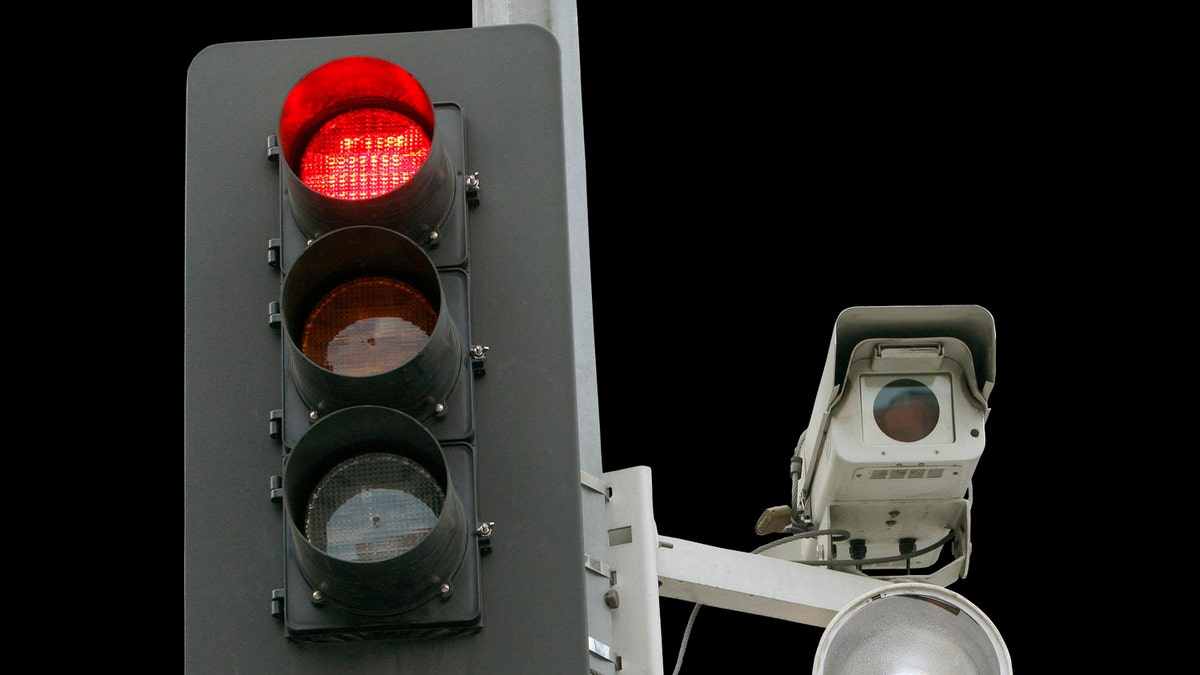
A red light camera setup is shown Wednesday Sept. 29, 2010 in Los Angeles. An audit by the Los Angeles city controller finds that red-light cameras haven't shown to improve public safety. The audit released Wednesday blames police for not adequately compiling statistics at the 32 intersections where red light cameras are installed, making it difficult to conclude whether they are effective. (AP Photo/Nick Ut) (AP)
When South Dakota passed a law last year protecting its citizens from camera-generated red light and speeding tickets issued by other states, the Australian company behind many of the controversial machines did not take it lying down.
The law bars South Dakota's division of motor vehicles from working with out-of-state jurisdictions on the automated tickets, and was aimed mainly at neighboring Iowa, which shares its southeastern border. Several towns in the Hawkeye State issued thousands of the tickets to drivers from South Dakota, who took their ire to lawmakers in Pierre.
"Our intention in passing this law in 2014 was to protect the citizens of South Dakota with respect to their due process rights, and that the burden of proof should not be shifted to the person accused," State Sen. Deb Soholt, whose district includes the South Dakota-Iowa border, told FoxNews.com.
"Our intention in passing this law in 2014 was to protect the citizens of South Dakota with respect to their due process rights, and that the burden of proof should not be shifted to the person accused."
Without South Dakota's official help in matching license plates to owners and addresses, Redflex Traffic Systems is still managing to track down violators and send them tickets, according to TheNewspaper.com, an online publication that covers driving-related news. The company has managed to issue more than 2,000 photo tickets to South Dakota residents since the beginning of the year using unspecified "alternative methods" to match up plates with car owners, the website reported.
"This is a real red flag," South Dakota State Rep. Arch Beal told FoxNews.com Tuesday. "They're accessing people's private records in a back entry way."
"We're absolutely fuming about this private information that Redflex is getting," added Beal, who claims the cameras serve no purpose other than to generate revenue.
A representative from Redflex did not return requests for comment.
"It's clear that it's not coming from the DMV," Soholt said of the information used to issue the tickets.
Iowa police, however, said the citations are being issued with information accessible to law enforcement.
"All of the citations that are issued are approved by a Sioux City police officer," Sgt. Mike Manthorne of the Sioux City, Iowa, Police Department told FoxNews.com. "When we approve those, we determine the registered owner at that time." He said Redflex only provides the technology needed to document speeders.

South Dakota Sen. Deb Soholt wrote the bill to protect her constituents from out-of-state camera tickets, but the company issuing them seems to have found a way around it. (Soholt for Senate)
Typically, if a camera in one state catches a violator from another state, motor vehicle agencies in both states work together to issue the ticket. Before South Dakota passed its law, Redflex -- which keeps a healthy portion of all revenue generated by its tickets -- would simply submit a South Dakota license plate number to South Dakota's DMV, requesting the name and address of its owner.
Red light cameras have been long been controversial in cities across the U.S. Advocates of the system claim it makes the roads safer because drivers are more conscious of running red lights, while critics say the cameras are simply money-making machines for towns and cities and often unreliable.
Of particular concern to South Dakota drivers is the stretch of Interstate 29 just over the border in northwestern Iowa, where the cameras are positioned to catch violators. South Dakota residents driving at the 65 mph speed had complained of missing the sign that changes the speed limit in Sioux City to 55 mph. The red light cameras would snap their license plate photos, resulting in a $168 fine sent weeks later through the mail.
Lt. Kevin Heineman, also of the Sioux City Police Department, told the TheNewspaper.com last week that Redflex has issued 2,640 photo tickets to South Dakota residents since the beginning of 2015. Cedar Rapids said its camera vendor issued two tickets to vehicles registered in South Dakota, according to the website, and Davenport's camera vendor issued nine citations.
Other cities in Iowa, meanwhile, said they are respecting South Dakota's law, expressing uncertainty over whether such tickets would hold up in court.
"We're not issuing South Dakota residents violations right now," Council Bluffs, Iowa, Police Sgt. Jason Bailey told the website. "We are waiting for Sioux City to see how things go with them."
Manthorne, meanwhile, took issue with the portrayal of red light cameras as merely money-generating machines.
"From my observation before and after the program, I've seen a dramatic decline in the number of speeders in those areas and a dramatic reduction in the number of fatalities," he said.
"I've seen a complete eradication of fatalities that are speed-related," he said. "The proof is in that."
FoxNews.com's Cristina Corbin contributed to this report.









































